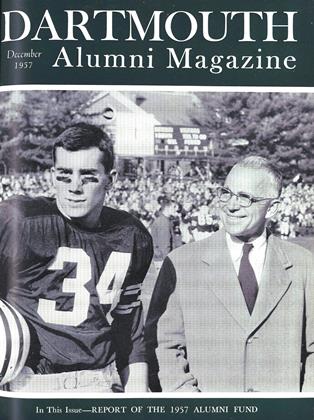By Luis Zalamea '42. BuenosAires: Botella al Mar, 1957. 90 pp.
Luis Zalamea, assistant director of the UN information center in Buenos Aires, makes his debut as a poet in that city with a miniature Canto general, written in a Spanish which, despite his Dartmouth degree, is uncontaminated by Anglicism of thought. It begins with the indignant lines of Spain's great satirist Quevedo:
Must one always feel regret for what one says? Must one never say what one feels?
It ends with the poem that lends its title to the volume: Requiem for New York.
From beginning to end we see the author communing deeply and reacting vigorously: there are his children, his friends, evocations of his childhood, sad and passionate women who invite and depart; there is the "human geogony" of Mexico, the Indian of Peru, the sea, vineyards, blood and sodium nitrate of Chile; there is Cape Cod, London, Scandinavia, New York. And surrounding everything, the water of rivers and oceans; he invokes Yamanja, a white goddess of the sea:
Now, Yaman, now, take me to your maternal bosom where I can whirl silently in your eddies and currents, now and in the hour of evening and foundering, now and in the hour of anguish and penumbra, now and in the hour of thy waters, Amen.
Probably of most interest to the Yankee reader are three poems dealing with this country. In Cape Cod, after a prelude of elemental sea and sand, we witness the nostalgic misery of a bride of long ago, brought from a Caribbean port into the northern mists by a whaling captain; she wanders through their big old house, desperately seeking the sun. The Oda a Enrique David Thoreau, very much in the style of Pablo Neruda, accuses New Englanders of having rejected the Walden non-conformist and shows him taking to Whitman's open road, joining hands with social outcasts and revoluntaries all over the world; New England is left desolate, isolated, sterile. Finally, there is the Requiemfor New York, a poem of several scenes (Greenwich Village, the Hudson, two guys standing inarticulate at a bar, people moping at slum windows, a once-elegant hotel where old men in tweeds engage in desperate battle with lobsters Thermidor). There are many reminiscences of Garcia Lorca's Poet in NewYork, especially in the spiritual frustration of "Anguish in the subway," an evocation of chewing gum, latrines, and vacuous stares.
Zalamea has recreated in this small volume something of the satire and the passion of his Spanish ancestor Quevedo; against the restrictions of Anglo-Saxon attitudes are flaunted the elemental drives (blood, earth, sea) of Hispanic temperament and zeal for liberty.
 View Full Issue
View Full Issue
More From This Issue
-
 Feature
FeatureA Dartmouth History Lesson for Freshmen
December 1957 By FRANCIS LANE CHILDS '06 -
 Feature
FeatureStymied in the Bowl
December 1957 -
 Feature
FeatureClass Achievemts, 1957 Fund
December 1957 -
 Feature
FeatureChairman's Report
December 1957 By William G. Morton '28 -
 Feature
FeatureDevelopment Program Leaders Named
December 1957 -
 Class Notes
Class Notes1952
December 1957 By RAYMOND J. BUCK JR., EDWARD J. FINERTY JR.
ELIAS L. RIVERS
Books
-
 Books
BooksAMERICAN FEMINISTS.
NOVEMBER 1963 By ALLEN R. FOLEY '20 -
 Books
BooksA DARTMOUTH READER.
MARCH 1970 By HERBERT W. HILL, A.M. '41 -
 Books
BooksA SYLLABUS OF LABORATORY EXAMINATION AND CLINICAL DIAGNOSIS.
June 1951 By John B. Holyoke, M.D. -
 Books
BooksHow YOU REALLY EARN YOUR LIVING.
October 1952 By L. G. Hines -
 Books
BooksHOW TO ADOPT A CHILD.
JULY 1967 By MICHAEL L. SLIVE '62 -
 Books
BooksTHE EXCURSION. A STUDY,
May 1950 By Vernon Hall Jr.



